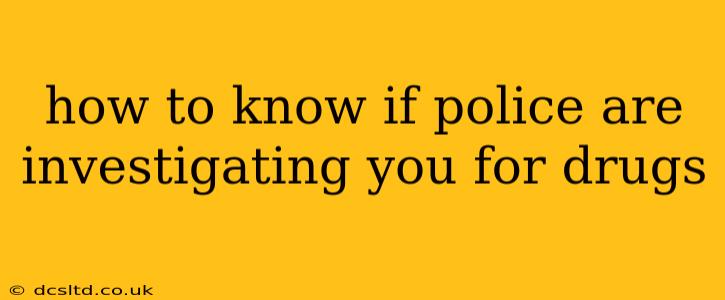The thought of a drug investigation can be incredibly stressful. Knowing whether or not you're under investigation is crucial for protecting your rights and potentially mitigating the situation. Unfortunately, there's no single definitive sign, but several indicators might suggest police scrutiny. This guide outlines potential signs and advises on how to proceed if you suspect an investigation.
What are some signs that the police might be investigating me for drugs?
This is a common question, and the answer unfortunately isn't straightforward. Police investigations are often clandestine to avoid tipping off suspects. However, certain events may raise suspicion.
Potential Signs of a Drug Investigation
-
Surveillance: This could involve unmarked cars following you, individuals seemingly observing your home or workplace, or even the use of sophisticated surveillance technology. Remember, however, that coincidental observations aren't necessarily evidence of an investigation.
-
Seizures/Confiscations: The police seizing assets such as your vehicle, electronic devices, or cash could indicate they suspect you're involved in drug-related activities. While this is a strong indicator, it's not conclusive proof of an active investigation. They may have already gathered sufficient evidence elsewhere.
-
Informants/Undercover Officers: Interactions with individuals who seem unusually interested in your activities or your associates could suggest the presence of informants or undercover officers. Be wary of unsolicited conversations about drug-related topics.
-
Unexpected Visits or Interactions: Unannounced visits from law enforcement officers, even if seemingly casual, can be a red flag. Their questions might focus on your associates, your activities, or your finances. This is especially concerning if they don't explicitly state the reason for their visit.
-
Unusual Phone Activity: This can include a noticeable increase in missed calls from unknown numbers, unusual text messages, or even a strange pattern of calls and texts that could be related to monitoring activities.
-
Changes in the Behavior of Your Associates: If your friends or acquaintances suddenly distance themselves or act unusually secretive, it could be a sign that they're cooperating with law enforcement.
What if I believe the police are investigating me for drugs?
This is a serious situation demanding careful consideration. Do not attempt to obstruct justice or destroy evidence. These actions would only worsen your situation significantly.
Should I contact a lawyer?
Yes, absolutely. Contacting a criminal defense attorney as soon as possible is crucial. They can advise you on your rights, help you understand the potential consequences, and guide you on how to proceed. A lawyer's expertise is invaluable in navigating the complexities of a drug investigation.
Should I talk to the police?
Generally, no. You are not obligated to speak to the police without legal representation. Anything you say can be used against you in court. Your lawyer can be present during any questioning and ensure your rights are protected.
What if I'm not guilty?
Even if you believe you have done nothing wrong, it's essential to seek legal counsel. The police may have misunderstood information or be acting on inaccurate reports. An attorney can help clarify the situation and protect your interests.
What if the police have a warrant?
If law enforcement presents a warrant, you should cooperate with the process. However, it's still crucial to have a lawyer present to ensure the search is conducted lawfully and your rights are respected.
This information is for educational purposes only and does not constitute legal advice. Always seek the guidance of a qualified legal professional for advice concerning your specific situation. The consequences of a drug-related investigation can be severe, so proactive legal representation is essential.
